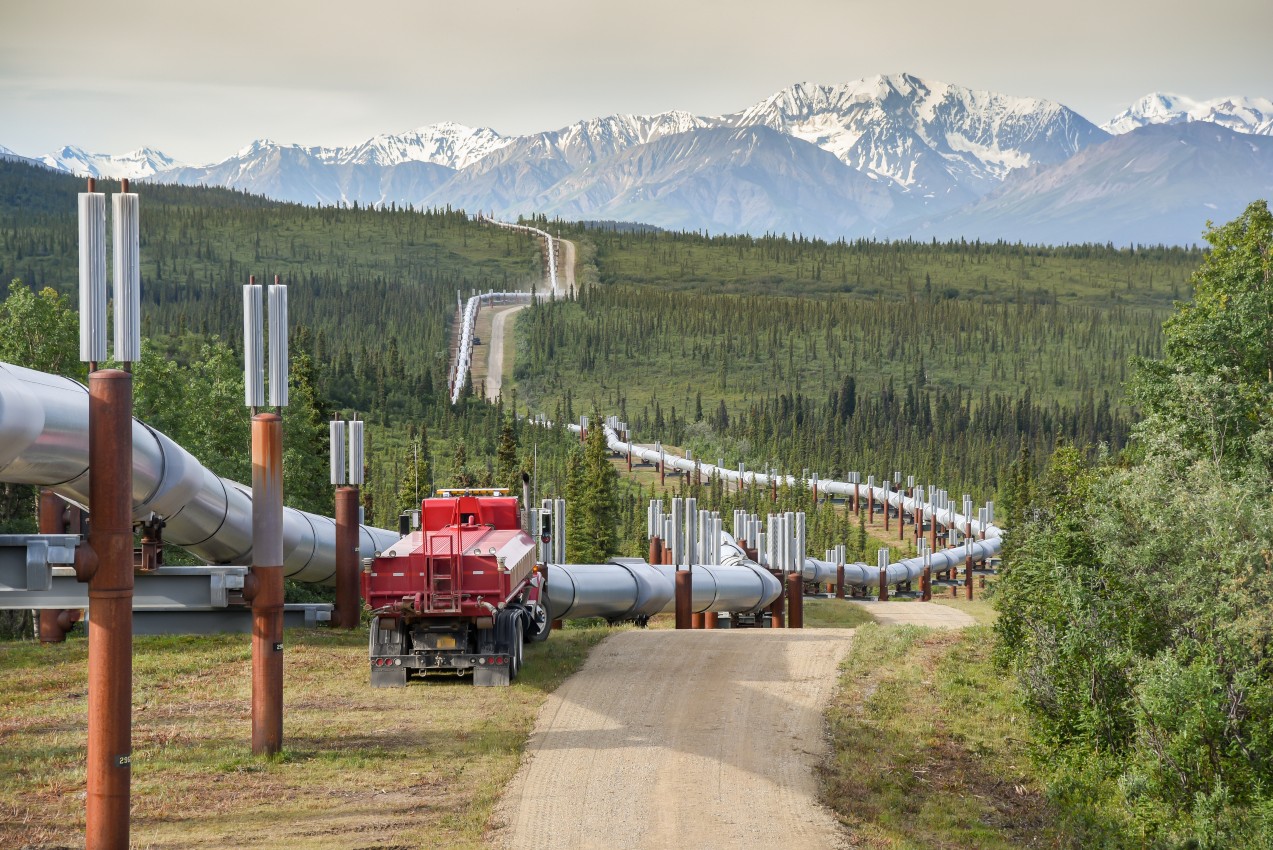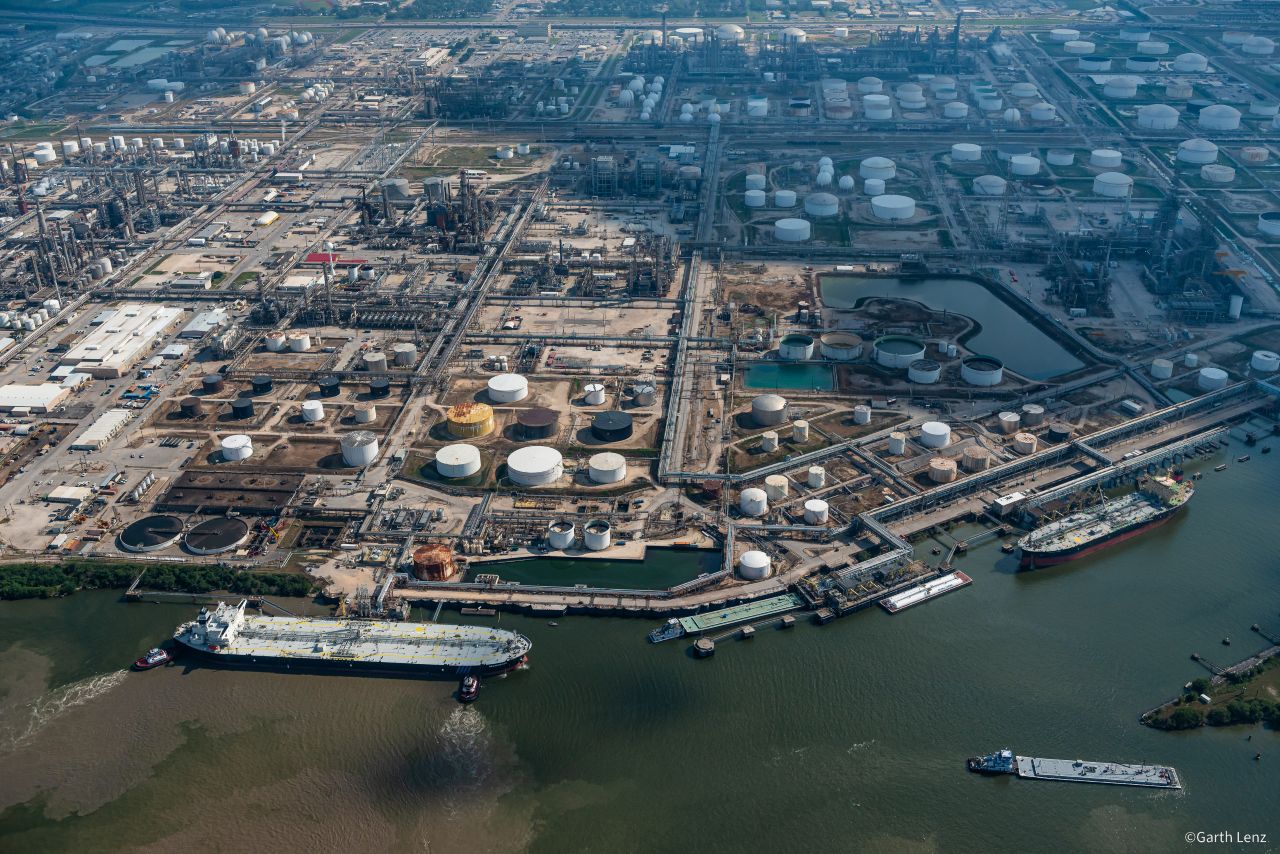Three Texas oil & gas industry sites that caught fire had long violation records

The three large refinery and petrochemical facilities along the Texas Gulf Coast that caught fire this month had long track records of environmental compliance problems, including a combined 5,469 violations over a decade but few penalties, according to state records.
In the worst of the three incidents, on May 15, a blaze at Marathon Petroleum’s Galveston Bay Refinery in Texas City, south of Houston, led to an explosion and fire that “burned alive” a 55-year-old machinist named Scott Higgins, according to a lawsuit filed against Marathon by his family members.
“The flames quickly engulfed his body,” the family’s petition states. “The severity of the fire made it impossible for anybody to reach Higgins to render aid or pull him out of the flames.”
The environmental violations at the Marathon refinery and at the facilities in Corpus Christi and near Houston may not have caused the fires, which are all still under investigation. But long records of repeat violations (2,791 at the Marathon refinery alone since 2012) often indicate a pattern of companies not investing in their equipment and safety measures.
The three Texas fires are part of a recent surge in similar incidents at industrial sites across the U.S. According to Reuters, seven of the 13 blazes at U.S. refineries so far this year have happened in Texas.
Brandon Marks, a Corpus Christi resident and lead organizer for Texas Campaign for the Environment, said in a statement that he’s “especially concerned for the workers and neighbors who may be at risk right now.”
“This is the third fire in less than two weeks at similar facilities across Texas,” Marks continued. “Refineries and petrochemical plants endanger our lives, health, and environment on an all too regular basis. If any environmental laws were violated, which is often the case, then Valero should be held accountable.”
Texas environmental regulators have long faced accusations of shielding companies from large fines and stringent enforcement measures. A May 2022 report by the staff of a Texas legislative oversight panel labelled the state’s regulatory agency as “reluctant regulators," referring to the Texas Commission on Environmental Quality (TCEQ).
“The commission often acts more as a final arbiter... encouraging industry members to self-govern and self-police," the report by the Sunset Advisory Commission staff said.
The most recent of the fires erupted on May 17. Valero’s West refinery in Corpus Christi burned only six months after another blaze broke out at another Valero refinery (called Valero East) in the same city.
The Valero West refinery had accumulated 732 violations since April 2012, according to data from TCEQ. Among the problems at the plant were violations of an EPA safety program, the Risk Management Program, that requires facility owners or operators to maintain the integrity of their equipment.
In the Houston area, on May 5, flames erupted from a Shell chemical plant in Deer Park, a heavily industrialized suburb along the Houston Ship Channel. The TCEQ had cited that plant for 1,946 violations since January 2012.
In each case, companies and regulators have not yet released the exact causes of the fires.
Valero West refinery had a history of violations and fines
Valero, the world’s largest global independent oil refiner, opened its West refinery in Corpus Christi in 1984. The refinery’s main products are gasoline, diesel fuel, jet fuel, liquified petroleum gas, and fuel oil, according to the EPA.
The West refinery is currently planning a major expansion, which includes the proposed construction of a new gas plant, cooling tower, power unit (boiler), tanks, liquified petroleum gas treating unit, and several other units, according to public records reviewed by Oil & Gas Watch News.
Eighty-three percent of the 6,095 residents who live within three miles of the plant are people of color, and 57 percent are low income, according to EPA figures.
Compared to the other two facilities that caught fire this month, Valero’s West refinery had a smaller number of violations. Still, the facility has had violations of the Clean Air Act considered “high priority” by EPA in 12 of the last 12 quarters since July 1, 2020, according to the EPA’s Environmental and Compliance History Online (ECHO) database.
Recent state-level violations include Valero’s failure to submit contingency plans to local emergency responders, failure to equip open-ended lines or valves with appropriate equipment to seal them, failure to comply with permitted concentration limits for carbon monoxide, and failure to repair a leaking component within the required timeframe. Of its 732 total violations, 149 are still considered “active” by state regulators.
In 2021, the EPA and Valero signed a consent agreement over a leak at the refinery that caused the release of nearly 53 pounds of hydrogen sulfide, a toxic gas, as well as nearly eight pounds of smog-forming volatile organic compounds, and nearly eight pounds of benzene, a carcinogen. Refinery personnel had on Jan. 1 of that year discovered that a pinhole leak had formed in the wall of a tube at the refinery that had corroded. The consent decree included a $40,000 penalty for violations of an EPA Risk Management Program rule that requires facility owners or operators to maintain the integrity of their equipment.
TCEQ records show that agency had fined Valero $67,843 as part of three enforcement orders issued over the last three years. The most significant was a $44,250 penalty the TCEQ approved March 8, after Valero failed to adhere to its permit limits for nitrogen oxide and carbon monoxide, both harmful gases that contribute to smog pollution. In 2019 and 2020, excessive emissions from multiple pieces of equipment led to excessive emissions of 5,891 pounds of nitrogen oxides and nearly 24 pounds of carbon monoxide.
Records show that as of the date of the enforcement order, Valero paid $17,700 of that $44,250, with another $8,850 deferred if Valero completed the terms of the order.
Such fines are relatively small for San Antonio-based Valero, which reported $11.5 billion in profits for its shareholders in 2022, more than 11 times the $930 million in profit the company made in 2021.
In October 2020, the EPA announced a $2.85 million settlement with Valero over Clean Air Act violations regarding fuel quality standards and reporting requirements at 11 refineries and one import facility across the U.S. These facilities included Valero’s East refinery in Corpus Christi, but not the Valero West refinery that caught fire last week. The settlement included $1.8 million in benzene reduction measures at Valero East intended to reduce benzene emission by 583 pounds per year.
Valero’s East refinery also caught fire in November 2022, emitting 32 pounds of unpermitted hydrogen sulfide over three and a half days, according to reporting by local TV news station KIII.
Two killed at Marathon Galveston Bay Refinery this year
Marathon Petroleum’s Galveston Bay Refinery in Texas City, is the second-largest in the U.S. Originally opened in 1934, the facility was owned by BP before Marathon acquired it in 2013 and merged it with the adjacent Texas City refinery in 2018.
The refinery is currently planning an expansion that would include a 40,000 barrel per day increase in crude processing capacity, according to public records reviewed by Oil & Gas Watch.
The deadly fire at the refinery on May 15 was the second deadly accident this year at the refinery. A 25-year-old worker named Alfredo Reyes was electrocuted while at work on Feb. 28.

TCEQ records show the refinery had an extensive list of violations. Of the 2,791 since March 2012, three were still considered “active.” Recent violations include failure to obtain analysis results of samples collected at the site, failure to maintain minimum oxygen concentrations on a piece of equipment, and failure to inspect tanks and calibrate equipment on schedule.
EPA records show the refinery had “high priority” violations of the Clean Air Act for 12 of the last 12 quarters since 2020. The plant had violations of the Clean Water Act for six of the last 12 quarters, with “significant/category 1 noncompliance” for one of those quarters (April 1 through June 30, 2022).
Between January 2013 and April 2023, the TCEQ assessed $687,137 in penalties for violations at the Marathon Galveston Bay Refinery. The TCEQ approved the largest of these fines – $125,563 – on March 25, 2020, for violations in 2015 and 2016. The violations included emitting 960 pounds of benzene, 2,069 pounds carbon monoxide, seven pounds of nitrogen oxides, and 1.5 pounds of sulfur dioxide.
Nearly two thirds of the 36,494 residents who live within three miles of the plant are people of color, and 45 percent are low income, according to EPA data.
Marathon, based in Ohio and one of the largest U.S. independent petroleum companies, had $14.5 billion in profits in 2022, nearly 50 percent higher than its 2021 profit of $9.7 billion.
In many cases, state law allows TCEQ to assess penalties as high as $25,000 per day for each violation. According to one report by Environment Texas using 2017 data, the agency fined violators a total of $1.28 million for unauthorized air pollution that occurred that year.
But that could have been almost 2,000 times higher -- as much as $2.3 billion -- if the agency had counted each pollutant released during an illegal air pollution event as a separate violation, the report states.
Lead photo: Smoke rises from the Valero West refinery in Corpus Christi, Texas. From video posted by @angelalpiazza on Twitter.















